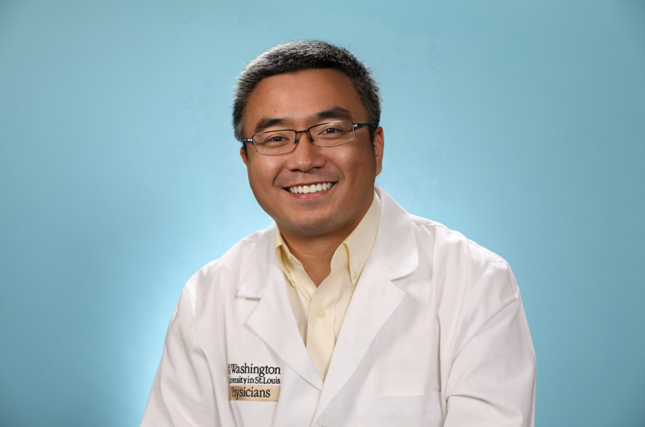For this Faculty Feature, we spoke with Rongbin Ge, MD, PhD, Assistant Professor, Anatomic and Molecular Pathology.
Tell us about your background. Where did you grow up, and when did you first become interested in science and medicine?
I grew up in Shanghai, China and began my medical training at Shanghai Jiao Tong University School of Medicine. From the start, I was fascinated by understanding disease at its most fundamental level. After completing my medical degree, I pursued a Ph.D. in Molecular and Cellular Biology with a focus on gene therapy at the Karolinska Institute in Sweden, and then finished postdoctoral training at Harvard Medical School. These early experiences in translational research and molecular biology laid the groundwork for my deep interest in the intersection of basic science and clinical medicine.
What is your career path?
My career path has taken me through several leading institutions and training programs. I spent years as a Research Fellow in Urology at Massachusetts General Hospital before completing my residency in Anatomic Pathology at the University of Massachusetts Medical School. I then pursued clinical fellowship training at Memorial Sloan Kettering Cancer Center and at Indiana University. Each of these steps allowed me to refine my diagnostic expertise, explore cutting-edge research techniques, and work closely with leaders in the field. Currently, as an Assistant Professor in the Department of Pathology & Immunology at Washington University School of Medicine, I focus on genitourinary (GU) pathology—encompassing diseases of the prostate, bladder, kidney, testis, and adrenal gland—while doing research that advances our understanding of GU malignancies.
What are your favorite parts of your current role?
One of the most rewarding aspects of my current position is the direct impact on patient care. Providing accurate, high-quality diagnoses can fundamentally shape treatment decisions and improve patient outcomes. I also value the unique combination of responsibilities—ranging from clinical service and research to teaching—because it allows me to continuously learn, contribute to the scientific community, and guide trainees as they develop their diagnostic reasoning skills and passion for GU pathology.
What is a memorable moment you’ve had while working in the department?
One memorable moment was guiding a trainee through a challenging diagnostic case. By carefully reviewing the slides, discussing differential diagnoses, and incorporating molecular results, we arrived at a complex diagnosis that directly influenced a patient’s treatment. Watching the trainee’s understanding deepen and recognizing the positive impact on patient care was both rewarding and a reflection of our department’s collaborative environment.
What special skills or talents do you have that people may not know about?
While my colleagues know me for my work in GU pathology and translational research, I’ve also developed an adaptable scientific skill set over the years. My background in molecular biology and cancer biology, combined with my training in diverse research environments, has given me a unique ability to integrate basic science and clinical knowledge. Additionally, my experiences in different cultural and academic settings have honed my communication skills, allowing me to work effectively with multidisciplinary teams and international collaborators.
What are some of your favorite hobbies or activities?
Outside the lab and the diagnostic suite, I enjoy activities that allow me to clear my mind and appreciate the world around me. I like traveling to new places or new countries, exploring nature, or engaging in hobbies that let me unwind and maintain a well-rounded life. These interests help me return to my professional work with fresh perspectives and renewed energy.
What is your advice to aspiring people in your field?
For those considering a career in pathology, I encourage embracing curiosity and maintaining a commitment to continuous learning. Pathology uniquely bridges basic science and clinical medicine, and it offers endless opportunities for growth. Seek mentors who inspire you, be open to emerging technologies and techniques, and never lose sight of the fact that your work can profoundly influence patient care. By blending detailed observation with scientific inquiry, you can make meaningful contributions to both individual lives and the broader medical community.
